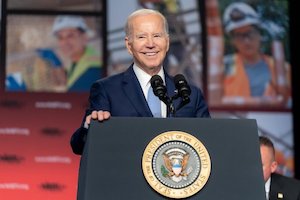Biden Administration Increases Tariffs on Chinese Imports

On the 14th of this month, U.S. President Joe Biden announced a new policy aimed at significantly increasing tariffs on goods imported from China. These goods include electric vehicles, computer chips, and medical products. Despite the potential strain on U.S.-China relations during an election year, Biden chose to implement these measures in hopes of gaining support from voters who are critical of his economic policies.
In a statement from the White House, it was declared that they would continue to enforce the tariff policies initiated by former Republican President Donald Trump and further strengthen other tariff measures. Their rationale is that China’s unfair practices, flooding global markets with low-priced goods, pose an unacceptable risk to U.S. economic security.
Here are the key points of the new tariff policy:
• Electric Vehicles (EVs): Tariffs will increase from the current rate to 100% this year, quadrupling the original rate.
• Semiconductors: Next year, tariffs on semiconductors will double from 25% to 50%.
• Critical Minerals: Tariffs on natural graphite and other key minerals will jump from 0% to 25%. Solar panels will also see an increase from 25% to 50%.
• Steel and Aluminum: Tariffs on steel and aluminum will be raised to 25%.
• Cranes: This year, cranes will face a 25% tariff increase. These new policies will impact Chinese imports worth $18 billion.
Before announcing these policies, an assessment was conducted on the tariffs imposed during the trade conflict between Washington and Beijing. In that trade war, former President Trump levied tariffs on approximately $300 billion worth of Chinese goods. The so-called “Section 301” investigation was the primary tool used by the Trump administration to justify these tariffs, and the U.S. Trade Representative was instructed to review their impact four years later.
According to data from the U.S. Census Bureau, in 2023, the U.S. imported goods worth $427 billion from China and exported goods valued at $148 billion to the world’s second-largest economy.
This trade deficit has persisted for decades and has become an increasingly sensitive issue in Washington.
- 222 reads
Human Rights
Fostering a More Humane World: The 28th Eurasian Economic Summi

Conscience, Hope, and Action: Keys to Global Peace and Sustainability

Ringing FOWPAL’s Peace Bell for the World:Nobel Peace Prize Laureates’ Visions and Actions

Protecting the World’s Cultural Diversity for a Sustainable Future

Puppet Show I International Friendship Day 2020

